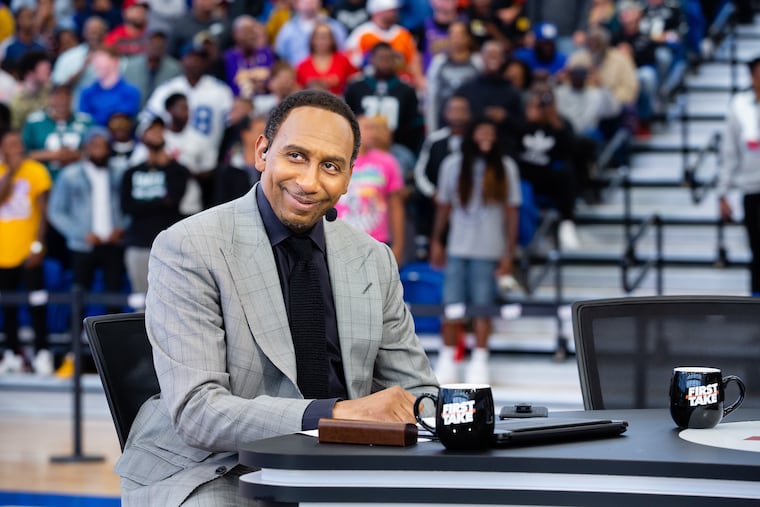ESPN’s Stephen A. Smith unloads on FS1, discusses Philadelphia Inquirer exit
“Whoever goes up against me, I’m taking them down,” Smith said at an ESPN media day event this week.

Stephen A. Smith is done playing nice with FS1.
For the past eight years, the outspoken ESPN star has been going head-to-head with his former First Take cohost, Skip Bayless. Over the years, Smith has avoided criticizing his former colleague publicly, but following Bayless’ departure from FS1 earlier this month, ESPN’s most visible personality isn’t holding back on what he thinks of the competition between the two networks.
“The biggest misnomer that was ever made was there was competition at the 10 o’clock hour,” Smith told reporters at ESPN’s media day event Wednesday. “We did over 1,600 shows. They came within half of our ratings twice. Two times … So this notion that suddenly we’ve won and the competition had finally been defeated, and ‘Wow, it was such a long, arduous battle.’ It’s just not true.”
First Take averages around 500,000 viewers per episode, according to Nielsen data provided by the network. By comparison, Undisputed often drew an audience below 50,000 viewers this year, according to Sports Media Watch.
As part of Bayless’ departure, FS1 has shaken up its morning schedule. Going up against Smith and his First Take cohosts now is The Facility, which features former Green Bay Packers wide receiver James Jones and three ex-NFL players who spent time in Philly — former Eagles running back (and soon to be team Hall of Famer) LeSean McCoy, Emmanuel Acho, and Chase Daniel.
Smith said he aims to crush his new competition.
“Whoever goes up against me, I’m taking them down,” Smith said.
“They put a sign up in our neighborhood, basically said they were coming for us,” added longtime SportsCenter anchor Scott Van Pelt, whose late-night show began its 10th season this week.
“And never arrived,” Smith said.
» READ MORE: ESPN and Jason Kelce will take over Xfinity Live! ahead of ‘Monday Night Football’
‘This ain’t for me’: Smith discusses exit from The Inquirer
Before he became ESPN’s most visible star, Smith spent 16 years as a reporter and columnist for The Inquirer.
He began as a beat reporter covering basketball in 1993, eventually covering the Sixers and then landing his own column, which highlighted his natural ability to offer opinions. One column he has said he regrets was a 2001 piece ripping beloved La Salle coach Speedy Morris when he was forced to resign, writing that an “affable demeanor shouldn’t camouflage ineptitude.”
“After that, I put more effort and due diligence in my work because I didn’t want to make a habit of having to apologize to people to their faces,” Smith told The Inquirer in 2017.
Smith broke a lot of Sixers news while at the paper, but said he became frustrated during the NBA playoffs in 2001 when The Inquirer expanded its coverage of the team and the excitement surrounding Allen Iverson and the team’s first appearance in the NBA Finals since 1983. It’s something local news organizations traditionally do during major sporting events — The Inquirer did the same thing during the Eagles’ recent Super Bowl run — but it rubbed Smith the wrong way.
“They threw everybody into the Sixers coverage and relegated me to 800 words a day,” Smith said. “And at that moment, I said, ‘This ain’t for me,’ because there’s got to be more.”
“I wanted an outlet that would allow me to speak extemporaneously and off the cuff, to express myself in depth with depth, and to do what I do,” Smith added. “And I saw the opportunity in sports talk radio and ultimately, television.”
Smith ultimately wrote columns for The Inquirer until 2010, but his shift from 800 words to speaking eight minutes a segment has obviously paid off — he’s in line to earn $18 million a year as part of a new deal with the network, according to Puck’s John Ourand. But even when Smith’s being ridiculous and offering outlandish opinions on First Take, he often still thinks of himself as a journalist first and an entertainer second.
“The journalistic integrity that I had has never gone away, and it never will go away,” Smith said.